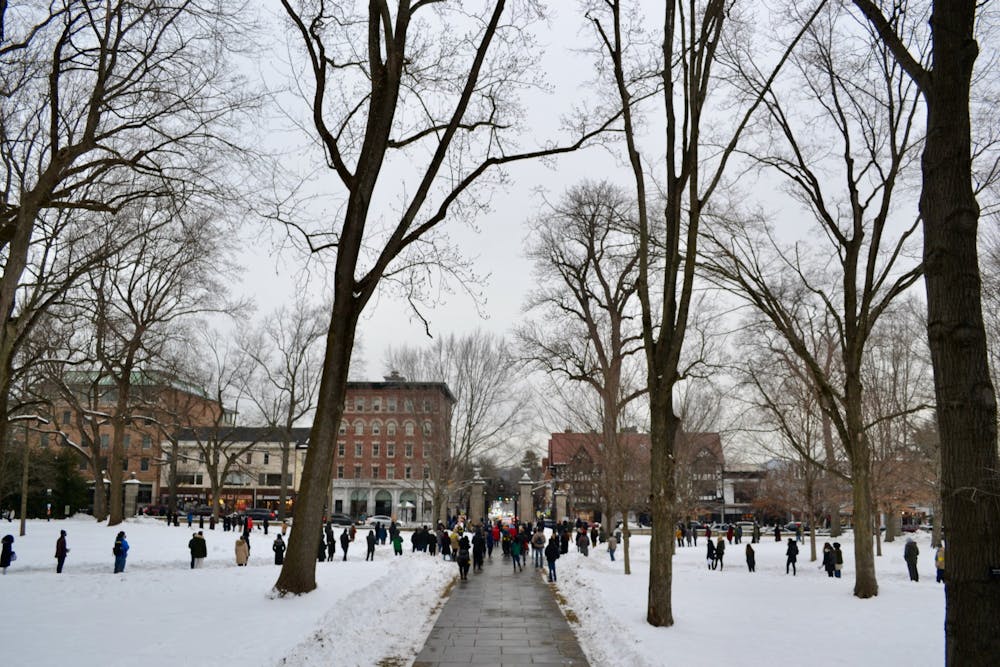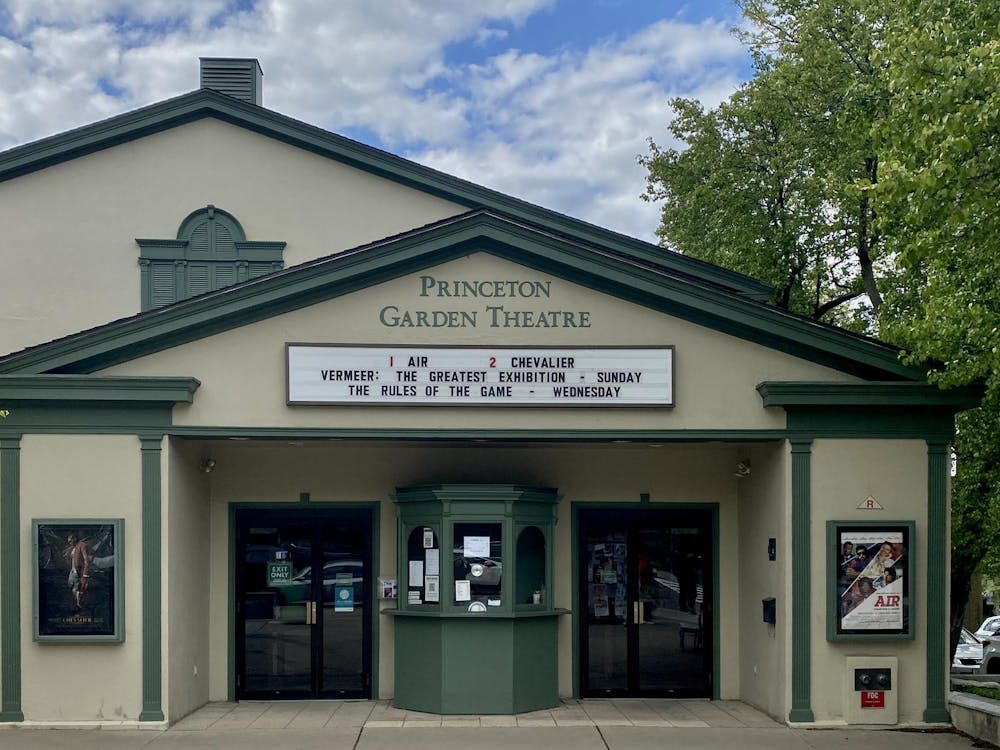On Feb. 13 at 4 p.m., approximately 175 protestors gathered in front of FitzRandolph Gate at the intersection of Nassau and Witherspoon Street to demand that the University expand COVID-19 testing, contact tracing, and vaccinations to the greater Princeton community as well as “democratize” its COVID-related decisions.
The protestors spread out along all walkways in front of Nassau Hall to maintain social distance. Organizers from Princeton Mutual Aid (PMA) wearing stripes of bright yellow tape moved among the crowd, reminding people to stay six feet apart while handing out flyers and hand warmers.
The protest was organized by PMA, Princeton Anti-Austerity Coalition (PAAC), Unidad Latina en Acción New Jersey (ULA), and Princeton Graduate Students United (PGSU), with the support of Divest Princeton.
“When undergraduates came back to campus, there was concern, not with the fact itself that undergraduates were coming back — people understand the urgencies in that situation — but with the fact that the University didn’t do anything to offer the community the type of recourse, the type of support, the type of health protections that were being offered to the students on campus,” said Paul Eberwine, a member of PGSU.
The idea for the protest arose when several organizations came together to discuss their shared concerns.
“All of these groups were talking to each other and realized that if we got together to apply pressure in a unified way, students standing with workers, undocumented laborers standing with graduate workers, and everything in between, we could really make something happen,” Eberwine said.
In recent weeks, leaders of several advocacy groups organized a list of six demands and presented the list during the protest. These include: that the University expand free testing, contact tracing, and quarantine housing to all residents of the municipality of Princeton, and that when vaccines become available to the general public, the University distribute them to residents of the municipalities of Princeton, Plainsboro, Lawrence, West Windsor, and Montgomery.

Protestors hold sign reading “COVID SUPPORT FOR ALL” at FitzRandolph Gate.
Marissa Michaels / The Daily Princetonian

According to Hrishikesh Somayaji, a graduate student who emceed at the protest, these demands came in response to three events: the University’s announcement that it would distribute vaccinations to its affiliates but not the the general public, the establishment of the University’s “state of the art testing lab that’s offered thousands and thousands of tests,” and the decision to bring back undergraduates “without consulting with the community at all.”
Deputy Vice President of Communications and University Spokesperson Ben Chang responded by explaining that Princeton University did, in fact, consult with elected officials before welcoming undergraduate students back to campus.
“Since the onset of the COVID-19 pandemic, Princeton has been consulting and collaborating closely with local and state-wide public health leaders, government officials, and many others. This collaboration has been built on a foundation of open communication, information sharing, and the common understanding that the unprecedented challenges posed by this global pandemic are constantly evolving,” Chang wrote in an email to The Daily Princetonian.
“When it came to decisions to resume laboratory research and limited library functions over the summer of 2020, for example, or to invite undergraduates back to campus for this spring semester, the University consulted with the elected officials that represent the communities within which we reside as well as state-wide policymakers,” Chang added.

Several protesters interviewed by the ‘Prince’ cited the University of California, Davis, as an example of how the University could expand its COVID-19 resources to protect the community at large. Since last fall, UC Davis has offered free COVID-19 testing and quarantine housing to the nearly 70,000 residents of the city of Davis.
Chang also responded to this comparison, writing to the ‘Prince’ that “[a] comparison between and among institutions and organizations in different states amounts to comparing apples to oranges. It is not valid.”
Chang emphasized that the funding infrastructures are completely different between the two institutions, noting in particular that UC Davis has medical and nursing schools, meaning greater medical infrastructure, as well as the fact that it is a public university and therefore funded with taxpayer dollars, “not through charitable donations made by private donors for the particular mission of education and research,” like Princeton.
Chang also argued that Princeton’s foremost role is as a university, not as a healthcare provider to the town.
“Princeton University is not a hospital, a health care provider, or a commercial clinical lab. And unlike many of its peers, it does not have a medical school or a school of public health. Princeton focuses on teaching and research and created a clinical testing lab so it can pursue its fundamental mission despite the pandemic. Princeton can — and is — making a difference during this pandemic through its research and teaching, not by becoming a health care provider” Chang said.

Protestors spread out across the many walkways in front of Nassau Hall to maintain six feet apart during the protest.
Nymisha Herrera Nimmagadda / The Daily Princetonian
The University has been able to support frequent testing of its undergraduate and graduate population with the opening of a testing lab housed in the Molecular Biology department.
Marc Schorin, an organizer of the protest, told the ‘Prince’ that he believes the University is testing “very selectively” amid limited local options for testing.
“Mercer County does provide free testing to its residents, but… practically, it’s not necessarily the most convenient thing if you’re working a full schedule and the pharmacy nearest to you do[es] not have the tests readily available and also those take a while to get back,” Schorin said.
“Especially for undocumented, uninsured, under-insured people, the University could really become a kind of major support system,” Schorin added. “It has the resources, it is simply choosing not to.”
Chang clarified to the ‘Prince’ that earning government approval for the on-campus testing lab and saliva testing as soon as possible meant entering into a binding contract. In order to do so, he said, “the University did agree to test only its own students, faculty, staff, and limited others who work or live on campus.”
In addition, Chang explained that the testing program did in fact benefit the Princeton community.
“The fact that the University cannot offer testing services to the general public does not mean there is not a benefit to the region. The testing program serves our campus community; our reporting of results and commitment to transparency is for the benefit of the broader community – and bolsters the ongoing, constant contact we have with our counterparts in the Municipality and County,” Chang said.
It was announced in January that the University will serve as a distribution point for COVID-19 vaccination.
“State officials asked the University to be prepared to serve as a fixed facility or closed POD (point of distribution) to vaccinate our students, faculty, and staff, along with their households,” Chang wrote. “Having the University provide this service would reduce the burden on public distribution sites.”
Chang explained that the University does not currently know when it will receive the COVID-19 vaccine, nor how much it will receive. He relayed that the University anticipates it will only receive enough doses to vaccinate its “undergrads, grad students, faculty, staff, and retirees, and certain affiliated staff,” and that the amount received will be determined by the state of New Jersey.
Despite this uncertainty, the University remains in contact with local officials.
“That has not stopped the University from nonetheless collaborating with the local officials with regard to vaccines, storing doses in our specialized cold storage facilities, hosting community clinics on campus because we have suitable space for what are somewhat complicated events, and assisting with the staffing of these clinics,” he added. “In fact, the reason that the Municipality of Princeton was able to hold clinics is because we were able to store its vaccine.”
Organizers were pleased with the number of students and locals that showed up.
“I think that it is amazing, that more people are conscious about the needs of communities of color,” said Jorge Torres, a regional director with the National Day Labor Organizing Network. “This exceeds expectations.”
“There’s power in presence and I just want to try and do my little bit,” said attendee Keely Toledo ’22.
Associate News Editor Marissa Michaels contributed reporting.








